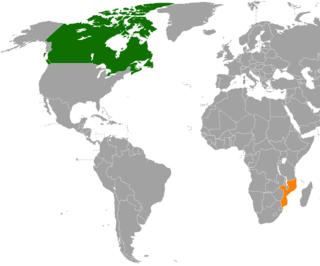History
CIDA was formed in 1968 by the Canadian government under Lester B. Pearson. CIDA reported to the Parliament of Canada through the Minister for International Cooperation. Its mandate was to "support sustainable development in developing countries in order to reduce poverty and contribute to a more secure, equitable, and prosperous world." [1] CIDA had its headquarters at 200 Promenade du Portage in Gatineau, Quebec. [2]
CIDA funding was the subject of intense debate, and the Conservative government made major revisions to the funding process, including reductions to NGOs described as supporting "left-leaning causes", such as Montreal-based Alternatives. [3]
Demise
In March 2013, the Conservative government announced that CIDA would be folded into the Department of Foreign Affairs, and the organizations renamed as the Department of Foreign Affairs, Trade and Development, [4] later renamed as Global Affairs Canada. [5] Critics said the merger would give insufficient attention to fighting poverty, but the Conservative government, and later the Liberal government that also kept CIDA programs under the same department, said the merger would lead to a more coherent international agenda. [6] [7] An internal report by the agency said that it would take up to 10 years for ex-CIDA employees to get used to the merger. [6]

The Foreign, Commonwealth & Development Office (FCDO) is a department of the Government of the United Kingdom. Equivalent to other countries' ministries of foreign affairs, it was created on 2 September 2020 through the merger of the Foreign & Commonwealth Office (FCO) and the Department for International Development (DFID). The FCO was itself created in 1968 by the merger of the Foreign Office (FO) and the Commonwealth Office. The department in its various forms is responsible for representing and promoting British interests worldwide.
The United Nations Development Programme (UNDP) is a United Nations agency tasked with helping countries eliminate poverty and achieve sustainable economic growth and human development. The UNDP emphasizes developing local capacity towards long-term self-sufficiency and prosperity.

The Department for International Development (DFID) was a department of HM Government responsible for administering foreign aid from 1997 to 2020. The goal of the department was "to promote sustainable development and eliminate world poverty". DFID was headed by the United Kingdom's Secretary of State for International Development. The position was last held between 13 February 2020 and the department's abolishment on 2 September 2020 by Anne-Marie Trevelyan. In a 2010 report by the Development Assistance Committee (DAC), DFID was described as "an international development leader in times of global crisis". The UK aid logo is often used to publicly acknowledge DFID's development programmes are funded by UK taxpayers.
Global Affairs Canada is the department of the Government of Canada that manages Canada's diplomatic and consular relations, promotes Canadian international trade, and leads Canada's international development and humanitarian assistance. It is also responsible for maintaining Canadian government offices abroad with diplomatic and consular status on behalf of all government departments.
The foreign relations of Canada are Canada's relations with other governments and nations. Canada is recognized as a middle power for its role in international affairs with a tendency to pursue multilateral solutions. Canada's foreign policy based on international peacekeeping and security is carried out through coalitions and international organizations, and through the work of numerous federal institutions. Canada's peacekeeping role during the 20th century has played a major role in its global image. The strategy of the Canadian government's foreign aid policy reflects an emphasis to meet the Millennium Development Goals, while also providing assistance in response to foreign humanitarian crises.

John Norman McKay is a Canadian lawyer and politician. He is the Liberal Member of Parliament for the riding of Scarborough—Guildwood. McKay was Parliamentary Secretary to the Minister of Finance from 2003 to 2006 during the government of Paul Martin, then served as an opposition MP and critic until November 2015 during the government of Stephen Harper. As of April, 2019, he serves as Chair of the Standing Committee on Public Safety and National Security; Chair of the Canadian Section of the Canada-United States Permanent Joint Board on Defence; Chair of the Canada-United Kingdom Inter-Parliamentary Association, Vice-chair of the Canada-United States Inter-Parliamentary Group, and Counsellor Canadian NATO Parliamentary Association.
Human Concern International (HCI) is a Canadian federally registered charitable non-governmental organization (NGO) working in international development and emergency relief assistance since 1980.

Australian Aid is the brand name used to identify projects in developing countries supported by the Australian Government. As of 2014 the Department of Foreign Affairs and Trade (DFAT) has been responsible for Australia's official development assistance to developing countries.

The Canadian Network for International Surgery (CNIS) is a non-profit organization that promotes the delivery of essential surgical care to underprivileged people in low-income countries. Its objective is also to reduce death and disability caused by any disturbances in normal functioning of the mind or the body that would require surgery. The CNIS emphasizes education in surgical work and techniques. It also works in surgical development and research.
The Deutsche Gesellschaft für Internationale Zusammenarbeit (GIZ) GmbH, often simply shortened to GIZ, is the main German development agency. It is headquartered in Bonn and Eschborn and provides services in the field of international development cooperation and international education work. The organization's self-declared goal is to deliver effective solutions that offer people better prospects and sustainably improve their living conditions.
Local Enterprise Investment Centre (LEIC) was a centre funded by Canadian Government through Canadian International Development Agency (CIDA) and managed by IDLC Finance Limited (IDLC) to lead investment projects in Bangladesh.

The Australian Centre for International Agricultural Research (ACIAR) is an Australian Government statutory agency that forms part of the overseas aid program in the Foreign Affairs and Trade Portfolio, reporting to the Minister of Foreign Affairs. ACIAR was established under the Australian Centre for International Agricultural Research Act 1982 (Cth),(the ACIAR Act), as amended, to identify agricultural problems in developing problems and brokers Australian agricultural scientists to find solutions.
NetCorps was a volunteer-organizing coalition consisting of nine Canadian non-governmental organizations (NGOs), funded by the Canadian International Development Agency (CIDA) and managed by the NetCorps coordination unit. Through the program, the organizations created international information and communication technologies (ICT) internships in developing countries around the world. Interns typically participated in six-month programs, leaving between August and November for host organizations in the placement countries. Positions were limited to 19–30-year-old Canadian citizens or landed immigrants who had "appropriate information and communication technologies skills". Typical duties included creating webpages, developing databases, computer networking, setting up hardware, preparing manuals and other documentation, and general-to-advanced computer instruction.
The Global Education Network Europe (GENE) is the European network of ministries, agencies and other national bodies responsible for support, funding and policy-making in the field of global education. Started in 2001 with 6 national structures, GENE has grown to include structures from 25 countries leading the provision of global education in Europe, with combined annual budgets in excess of 150 million Euro.

Canada–Mali relations are the bilateral relations between the countries of Canada and Mali. Mali has an embassy in Ottawa whilst Canada has an embassy in Bamako.

Canada–Democratic Republic of the Congo relations are the bilateral relations between Canada and the Democratic Republic of the Congo. Canada has an embassy in Kinshasa and D.R. Congo has an embassy in Ottawa.

Canada–Mozambique relations are the interactions between the countries of Canada and Mozambique. These relations began in 1975 after Mozambique became an independent country. Since gaining independence, Canada and Mozambique have engaged in peaceful diplomatic relations.
Grand Challenges Canada (GCC) is a Canadian nonprofit organization that uses a Grand Challenges model to fund solutions to critical health and development challenges in the developing world.
Knute Bjarne Buttedahl was a Canadian expert on global education and international development, and faculty professor of adult education at the University of British Columbia, in Vancouver BC, Canada. Buttedahl was a fellow of The World Academy of Art and Science (WAAS). In addition, he served as a project manager and field expert for the Canadian International Development Agency (CIDA), UNESCO Canada and UNICEF Canada; assisting initiatives in Africa, Asia and Latin America dedicated to Global citizenship education.








